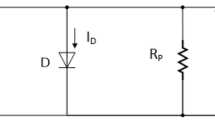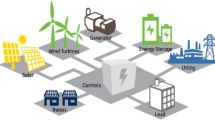Abstract
Solar photovoltaic (PV) energy has witnessed growth in the past decade. Nowadays, PV energy systems have proved to be effective methods for renewable energy resources with minimum environmental impacts. Due to these environmental and economic benefits, PV systems are being widely deployed as distributed energy resources in distribution generation systems or microgrids. Maximum power point tracking (MPPT) algorithms have an important role to play due to optimization performance in these systems. In this paper, PV array output voltage has been optimized by increasing the MPPT algorithm performance. A new hybrid fuzzy-neural MPPT controller is proposed. Training data in neural network are optimized by genetic algorithm. The proposed controller is simulated and studied using MATLAB software. The obtained results show superior capability of the suggested method in MPP tracking under rapid fluctuation of atmospheric conditions and converter load.

Similar content being viewed by others
Abbreviations
- R S :
-
Series resistance of a solar cell in Ω
- R sh :
-
Parallel resistance of a solar cell in Ω
- I c :
-
Output current of the PV cell in A
- V c :
-
Output voltage of the PV cell in V
- I ph :
-
Photon generated current in A
- V o :
-
Voltage impact of K oc
- I :
-
Output current of the PV panel in A
- V :
-
Output voltage of the PV panel in V
- I s :
-
Inverse saturation current in A
- n :
-
Ideal diode quality coefficient
- K :
-
Boltzmann’s constant (1.38\({\times }\) 10−23J/° k)
- n s :
-
Number of solar cells connected in series
- n p :
-
Number of solar cells (or panels) connected in parallel
- q :
-
Charge of an electron(1.6\({\times }\) 10−19 C)
- G :
-
Irradiation density in W/m2
- T :
-
Temperature in °C
- I sc :
-
Short circuit current in A
- K sc :
-
Temperature coefficient of I sc in 1/ °C
- K oc :
-
Temperature coefficient of V oc in V/ ° C
- MPP:
-
Maximum power point in W
- V mpp :
-
Voltage at the MPP in V
- R mpp :
-
Resistance at the MPP in Ω
- V array :
-
Output voltage of the PV array in V
- I array :
-
Output current of the PV array in A
- P array :
-
Output power of the PV array in W
- V opt :
-
Optimized voltage resulted from genetic algorithm corresponding to V mpp in V
- V ref :
-
Neural network’s output (reference voltage) in V
References
Piegari L., Rizzo R.: Adaptive perturb and observe algorithm for photovoltaic maximum power point tracking. Renew. Power Generation IET. 4(4), 317–328 (2010)
Luo, W.; Han, G.: Tracking and Controlling of Maximum Power Point Application in Grid-connected Photovoltaic Generation System. In: Second International Symposium on Knowledge Acquisition and Modeling, pp. 237–240 (2009)
Luo, W.; Han, G.: The Algorithms Research of Maximum Power Point Tracking in Grid-connected Photovoltaic Generation System. In: Second International Symposium on Knowledge Acquisition and Modeling, pp. 77–80 (2009)
Abdelsalam A.K., Massoud A.M., Ahmed Sh., Enjeti P.N.: High-performance adaptive perturb and observe MPPT technique for photovoltaic-based microgrids. IEEE Trans. Power Electron. 26(4), 1010–1021 (2011)
Esram T., Chapman P.L.: Comparison of photovoltaic array maximum power point tracking techniques. IEEE Trans. Energy Conv. 22(2), 439–449 (2007)
Xiao, W.; Elnosh, A.; Khadkikar, V.; Zeineldin, H.: Overview of Maximum Power Point Tracking Technologies for Photovoltaic Power Systems. In: 37th Annual Conference on IEEE Industrial Electronics Society, pp. 3900–3905 (2011)
Cai, X.-c.; Fu, B.; Huang, Y.-w.; Xing, X.; Yu, L.; Yi, N.: A Research of MPPT Implementation Strategy Based on the Improved Conductance Increment Method. In: International Conference on Image Analysis and Signal Processing (IASP), pp. 529–532 (2011)
Shihong, Q.; Wang, M.; Chen, T.; Yao, X.: Comparative Analysis of Incremental Conductance and Perturb-and-Observation Methods to Implement MPPT in Photovoltaic System. In: International Conference on Electrical and Control Engineering (ICECE), pp. 5792–5795 (2011)
Hiyama T., Kitabayashi K.: Neural network based estimation of maximum power generation from PV module using environment information. IEEE Trans. Energy Conv. 12(3), 241–247 (1997)
Hiyama T., Kauuma S., Imakubo T.: Identification of optimal operating point of PV modules using neural network for real time maximum power tracking control. IEEE Trans. Energy Conv. 10(2), 360–367 (1995)
Ramaprabha, R.; Gothandaraman, V.; Kanimozhi, K.; Divya, R.; Mathur, B.L.: Maximum Power Point Tracking using GA Optimized Artificial Neural Network for Solar PV System. In: 1st International Conference on Electrical Energy Systems (ICEES), pp. 264–268 (2011)
Ramaprabha R., Mathur B.L.: Intelligent controller based maximum power point tracking for solar PV system. Intern. J. Comp. Appl. 12(10), 37–41 (2010)
Long, J.; Chen, Z.: Research on the MPPT Algorithms of Photovoltaic System Based on PV Neural Network. In: Control and Decision Conference (CCDC), pp. 1851–1854 (2011)
Kohata Y., Yamauchi K., Kurihara M.: High-speed maximum power point tracker for photovoltaic systems using online learning neural networks. J. Adv. Comput. Intell. Intellig. Inform. 14(6), 677–683 (2010)
Hadji, S.; Krim, F.; Gaubert, J.P.: Development of an Algorithm of Maximum Power Point Tracking for Photovoltaic Systems Using Genetic Algorithms. In: 7th International Workshop on Systems, Signal Processing and their Applications (WOSSPA), pp. 43–46 (2011)
Ramaprabha, R.; Gothandaraman, V.; Kanimozhi, K.; Divya, R.; Mathur, B.L.: Maximum Power Point Tracking using GA Optimized Artificial Neural Network for Solar PV System. In: 1st International Conference on Electrical Energy Systems (ICEES), pp. 264–268 (2011)
Ramaprabha R., Mathur B.L.: Intelligent Controller based Maximum Power Point Tracking for Solar PV System. Intern. J. Comp. Appl. 12(10), 37–41 (2011)
Kulaksiz A.A., Akkaya R.: Training data optimization for ANNs using genetic algorithms to enhance MPPT efficiency of a stand-alone PV system. Turkish J. Electrical Eng. Comp. Sci. 20(2), 241–254 (2012)
Bekker, B.; Beukes, H. J.: Finding an Optimal PV Panel Maximum Power Point Tracking Method. In: 8th AFRICON Conference in Africa, pp. 1125–1129 (2004)
Midya, P.; Krein, P.T.; Turnbull, R.J.; Reppa, R.; Kimball, J.: Dynamic Maximum Power Point Tracker for Photovoltaic Applications. In: 27th Annual IEEE Power Electronics Specialists Conference, pp. 1710–1716 (1996)
Koizumi, H.; Kurokawa, K.: A Novel Maximum Power Point Tracking Method for PV Module Integrated Converter. In: Proceedings of the 36th IEEE Power Electronic Specialists Conference (PESC-04), Recife, pp. 2081–2086 (2005)
Solarex data sheets. www.solarex.com
Author information
Authors and Affiliations
Corresponding author
Rights and permissions
About this article
Cite this article
Vincheh, M.R., Kargar, A. & Markadeh, G.A. A Hybrid Control Method for Maximum Power Point Tracking (MPPT) in Photovoltaic Systems. Arab J Sci Eng 39, 4715–4725 (2014). https://doi.org/10.1007/s13369-014-1056-0
Received:
Accepted:
Published:
Issue Date:
DOI: https://doi.org/10.1007/s13369-014-1056-0




